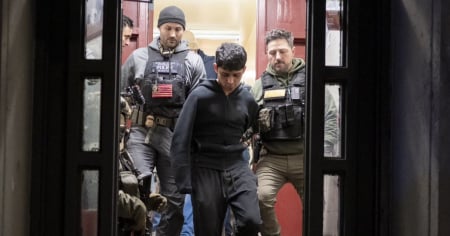The Cuban influencer known as Billy Ta Lento has once again captured attention on social media with a peculiar act that blends humor, culture, and social commentary.
In a video posted on his TikTok account, Billy makes an offering in the style of Cuban santería in front of one of the iconic towers owned by former U.S. President Donald Trump.
The act, which has elicited laughter and comments from thousands of users, aims to symbolically "help" Cubans in the United States who are in a complicated immigration situation, especially those who hold the I-220A form, a document that grants conditional freedom but does not guarantee a permanent legal status.
"Trust me" and "I’ve done the work, now ask away" are some of the phrases with which the young man concluded his performance, overflowing with creativity and humor in a context that impacts many Cuban migrants in the country.
In the video, Billy uses characteristic elements of a santera offering, including candles and other ritual objects, strategically placed in a visible spot in front of the tower.
Her performance not only highlights the typical ingenuity of Cubans but also raises a reflection on the legal and bureaucratic difficulties faced by those carrying the I-220A in their pursuit of a better life.
The video has generated a wave of comments on TikTok, where the influencer's followers celebrate his unique way of blending humor with real situations that affect the Cuban community. “This is a masterpiece, Billy, you represent us all,” commented one user, while another added, “Only a Cuban can mix Santería and politics with such grace.”
Meanwhile, other users took the opportunity to discuss immigration policies and the legal challenges faced by holders of the I-220A, emphasizing the uncertainty experienced by thousands of migrants in the United States.
Frequently asked questions about the I-220A immigration status and the situation of Cubans in the U.S.
What is the I-220A form and why is it important for Cubans in the U.S.?
The I-220A is a document that grants parole to migrants, allowing them to remain in the U.S. while their immigration status is determined. For many Cubans, this represents a legal limbo, with no access to permanent residency and the inability to return to their home country without risks.
How does the immigration situation affect Cubans with I-220A emotionally?
Family separation has a deep emotional impact on Cuban emigrants, who often suffer from nostalgia, sadness, and anxiety. Holidays and important family moments intensify these feelings as they remind them of the absence of their loved ones.
What are the legal challenges faced by Cubans with an I-220A in the United States?
Cubans with I-220A face multiple challenges, such as legal uncertainty and a lack of access to permanent residency. Furthermore, they must adapt to economic and cultural differences in the United States, which can be a complex and stressful process.
What impact could a change in the U.S. administration have on Cubans with I-220A?
The U.S. presidential elections could significantly influence immigration policies, affecting Cubans with I-220A. A change in administration could either open new opportunities or, conversely, tighten policies towards migrants, increasing uncertainty about their future in the country.
What role do social media play in raising awareness about the situation of Cubans with I-220A?
Social media is a key tool for highlighting the reality and challenges faced by Cubans with I-220A. Through platforms like TikTok, migrants share their experiences, spark debates, and find support within the community, helping to raise awareness about their situation and the issues they face.
Filed under:
